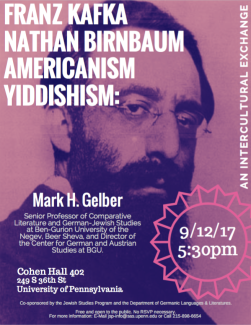Event

Mark H. Gelber is Senior Professor of Comparative Literature and German-Jewish Studies at Ben-Gurion University of the Negev, Beer Sheva and Director of the Center for German and Austrian Studies at BGU. He was elected in 2001 to membership in the German Academy for Language and Literature (Darmstadt). He has served as visiting professor or senior research fellow at the University of Pennsylvania, University of Graz, University of Maribor, Yale University, University of Auckland, Universiteit Antwerpen, RWTH Aachen University, New York University, and Renmin University, Beijing. His major areas of research and publication include German/Austrian-Jewish Literary and Cultural History, Cultural Zionism, and Literary Anti-Semitism. His most recent publications focus on Stefan Zweig, Max Brod, Franz Kafka, Jewish Sensibilities in Austrian Literature, and Multilingualism in the Literature of Survival. Nathan Birnbaum (1864-1937), a major but mostly neglected and mercurial figure in modern Jewish cultural history, has been mentioned occasionally, but always briefly, in Kafka scholarship. Usually, it is within the context of Birnbaum's visit and lecture in Prague, which Kafka attended, or regarding Kafka's fascination with Yiddish theater and the Yiddish language that the connection between the two has been forged. This lecture claims that Birnbaum's writings played a major role in mediating a particular view of "Americanism" ("Amerikanismus") in Kafka's larger understanding of nationality or nationalist possibilities in general, which in turn exerted an impact in particular on Kafka's evolving ideas about Jewish nationality. Birnbaum's views, filtered through the alembic of Kafka's inquiring mind and his creative literary process,naturally found their way into his writing, for example into the conception of his early novel project set in the U.S., Der Verschollene (Amerika, The Missing Person). The American-Yiddish-Jewish intercultural exchange between Birnbaum and Kafka is an unknown but very telling and important aspect of the background for the development of Kafka's early thought and writing. Co-sponsored by the University of Pennsylvania Jewish Studies Program and the Department of Germanic Languages & Literatures.Free and open to the public. No RSVP necessary. For more information: E-Mail jsp-info@sas.upenn.edu or Call 215-898-6654
